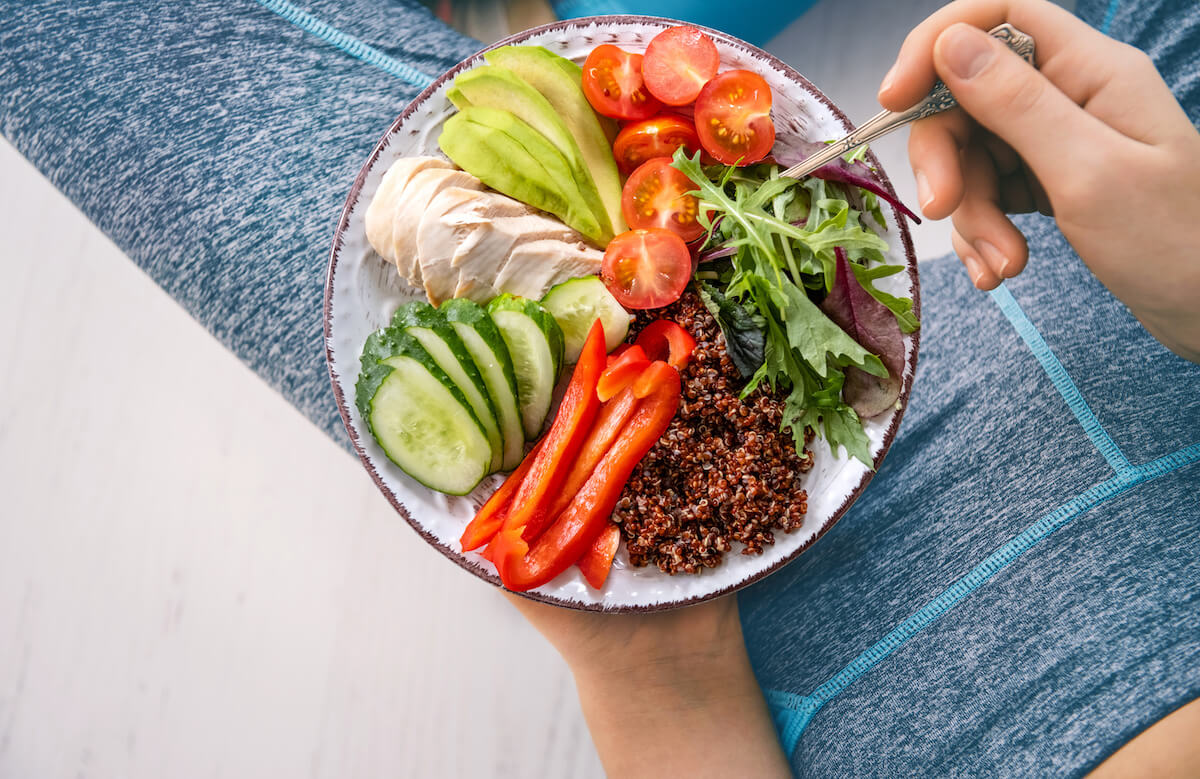
20 Jun Pre-Workout Meals: How to Set Yourself Up for the Best Results
What you put into your body matters just as much as how intensely you work out. Choosing the right foods for your pre-workout meals makes all the difference to your energy levels, performance, and recovery. And that goes double if you’re an endurance athlete or bodybuilder.
But what makes for good pre-workout nutrition? We’ll clarify what it should include (and what it shouldn’t) and discuss the timing of your pre-workout meals — because when you eat matters too. We’ll also share some pre-workout meal ideas to help you pull it all together.
Pre-Workout Foods Your Body Needs
When you’re putting a lot of effort into your training session, you want to make sure it pays dividends. The best foods will help keep your energy levels high (without a sugar spike), fuel your performance, and help your body recover more easily.
To achieve these goals, you need to include all the macronutrients in your pre-workout meals: carbohydrates, protein, and fat.
The amount of each macronutrient you have in a meal will depend on a few factors, including your exercise goals and how long and intensely you’re planning to work out.
For example:
- For short, high-intensity cardio sessions, your body needs access to a lot of energy quickly, so you want to go heavier on the carbs.
- For longer, moderate-intensity sessions, your body uses fat as an energy supply. If you’re more of an endurance athlete, make sure you’re getting enough healthy fats — preferably not too close to your workout time as they do take a while to digest.
- If you’re building muscle mass and strength, your body needs protein to support muscle protein synthesis.
Let’s look at each of the macronutrients to help you understand what they do for you as part of your pre-workout meals.
Note: Although there is such a thing as fasted cardio, going into your workout with an empty stomach isn’t necessarily the best idea. If your body can’t get enough fuel from your pre-workout meal, it will start breaking down your muscle to access the glycogen stored there. And, no matter what your health goals are, you probably don’t want to lose any muscle.
Carbs
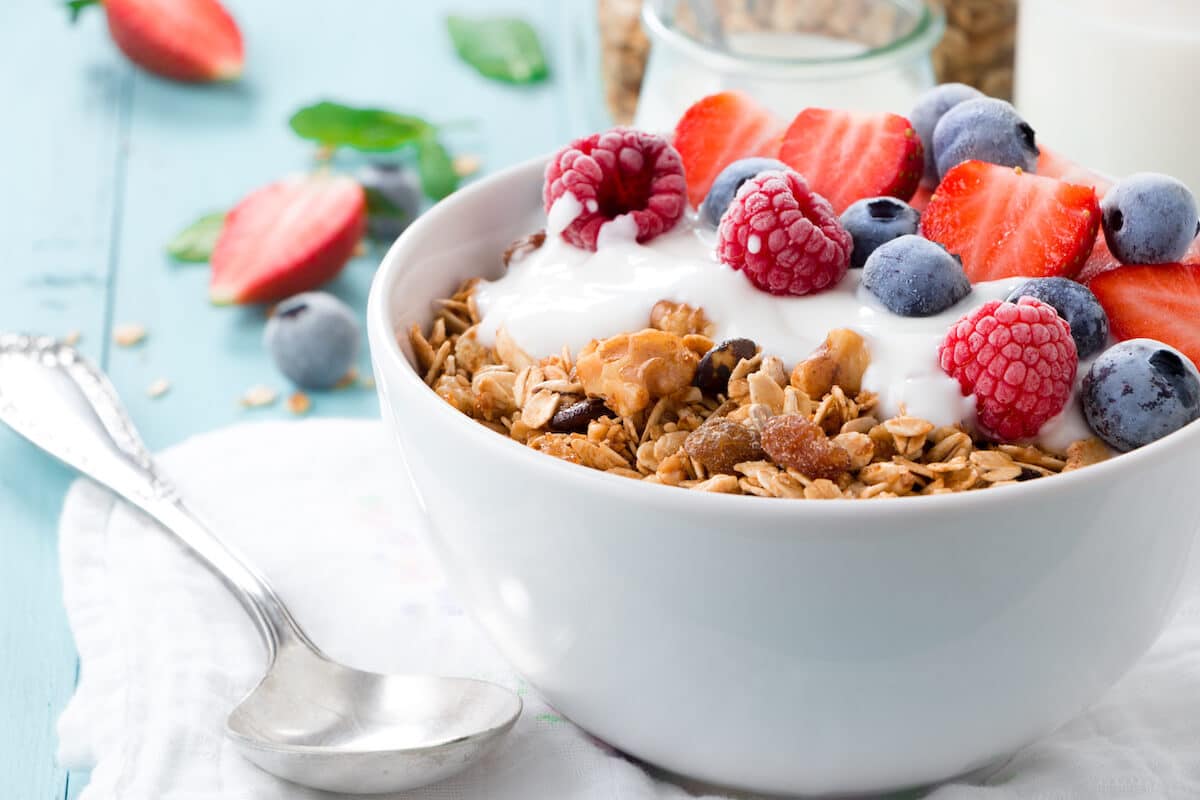
Of the three macronutrients, carbohydrates are the best and most readily available sources of energy. They break down into glucose, which your body can then use for your high-intensity workout. Any glucose that isn’t used immediately is processed and stored as glycogen, mostly in your liver and muscles.
Excellent sources of carbohydrates include:
- Whole grains like quinoa, brown rice, and oats
- Whole-wheat pasta
- Whole-wheat bread
- Bananas, which are also excellent sources of potassium
- Blueberries
- Veggies like potatoes and sweet potatoes
- Dried fruit
Healthy Fats
Fats can also help give you energy, although your body will only access fat once it’s exhausted your supply of glucose. Fat is therefore excellent for longer, endurance exercise workouts. It takes a while to digest, so avoid eating a lot of fat too close to your workout.
Examples of foods that contain plenty of healthy fats include:
- Olive oil
- Avocados
- Nuts
- Full-fat yogurt
- Seeds like sunflower and pumpkin seeds
- Fatty fish like salmon
Protein
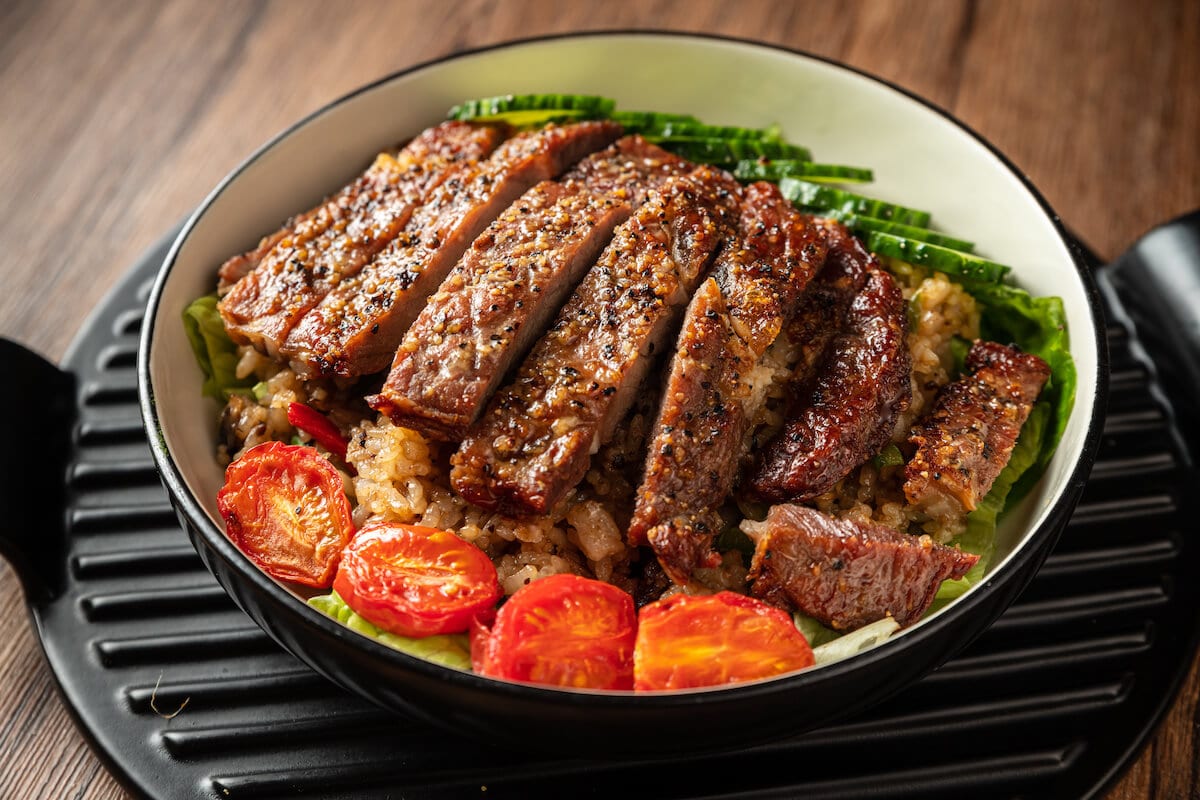
Protein has many vital functions in your body. When you consume protein in your pre-workout meal, it gets broken down into amino acids. Those amino acids are used to build new proteins which make up the entire skeletal system of your body, including your bones, organs, and muscles. Protein also supports your immune system and can be a source of energy, although only as a last resort — your body will use the available carbohydrates and fat first.
Protein is particularly important if you’re doing resistance training and aiming to build muscle mass and strength. As we’ve mentioned, your muscles are made up of protein. Every time you lift weights, you create micro-tears in your muscles. Your body repairs those micro-tears as you rest, using protein to help you recover and rebuild the muscles so they’re bigger and stronger.
Excellent high-protein food sources include:
- Lean beef
- Chicken
- Turkey
- Fish
- Eggs, especially egg whites
- Greek yogurt, which is higher in protein and lower in carbs than regular yogurt
- Nut butters, like almond, macadamia, peanut butter, and almond butter
A quick and easy way to get extra protein into your pre-workout meal is to use a supplement like protein powder. You can add it to a protein shake or many other dishes, such as oats, soups, and stews.
Protein powders come from different sources, including animals and plants. If you can tolerate lactose, whey protein is a good option. If not, try pea protein or rice protein.
When you’re looking for a protein powder supplement, choose a high-quality brand that gives you all the benefits you’re looking for. For example, Ingredient Optimized protein powder has been independently proven to be more bioavailable than non-optimized protein powders, making every gram of protein count towards your muscle building, strength, and recovery.
You’ll find Ingredient Optimized protein in these partner brands:
Timing of Your Pre-Workout Meals
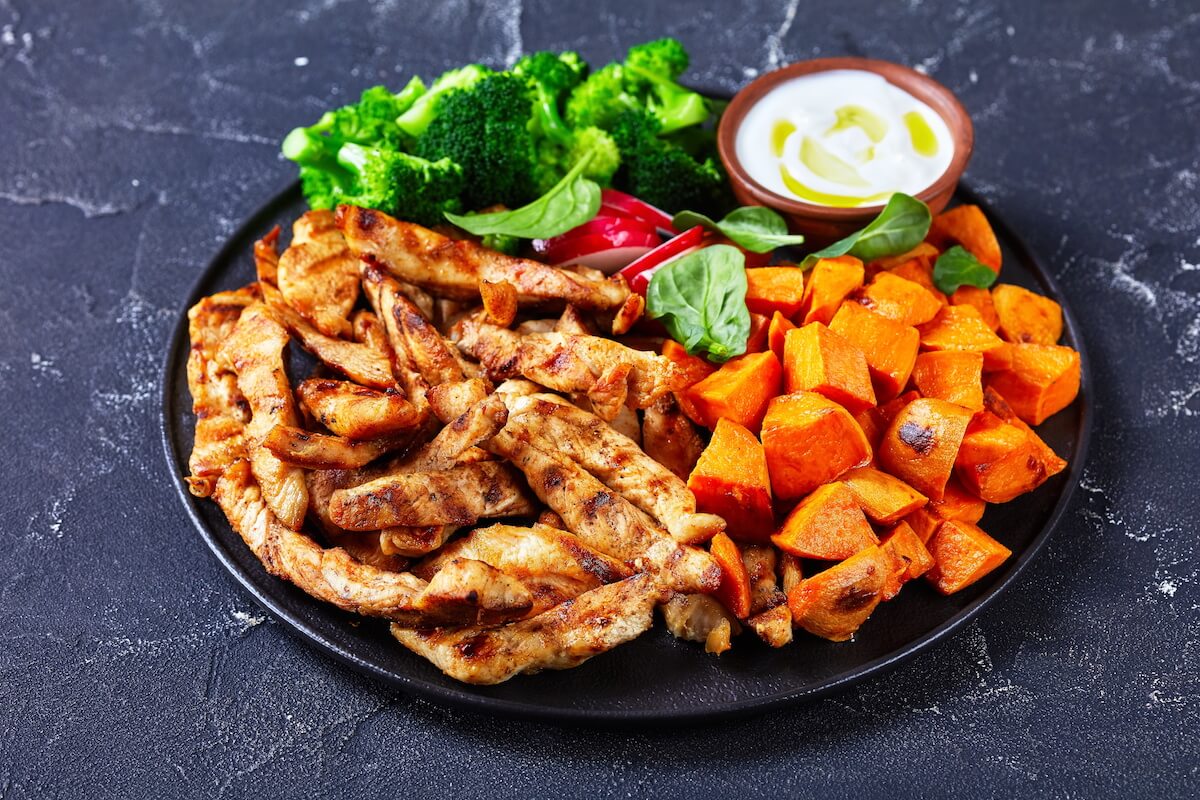
When you eat your pre-workout meals is also worth considering although it’s not the end-all, be-all factor. Complex carbs, such as whole grains or sweet potatoes, take about 90 minutes to digest and give you a sustained energy boost over time. Simple carbs like fresh and dried fruit and sports drinks digest much faster, so common advice is to consume those within about 30 minutes of your workout (just don’t have too much or your blood sugar could spike).
Protein digestion time varies according to the type of protein. Protein powders like whey digest fastest and can be taken within an hour of your workout. Eggs and fish also digest relatively quickly, followed by chicken and turkey. Red meat like beef, lamb, and pork can take four or five hours to digest fully.
If you’re eating a substantial meal that includes slower digesting protein, aim to have it two to three hours before your workout. That gives your body enough time to digest and absorb most of the nutrients needed to fuel your training session.
If you can’t eat so far in advance, have a smaller pre-workout snack — including simple carbs plus faster-digesting protein — and keep the fat content low. Fat takes the longest to digest and it’s no fun working out feeling while feeling uncomfortable.
As you get even closer to your workout — less than an hour — stick to food that’s very easy to digest, like a protein shake or smoothie, or fruit and nut butter. You could also have a shake during your workout if you need a quick boost of energy.
All that said, the latest research suggests that the precise timing of your meals may not be as important as total protein intake. With this in mind, experiment with when you eat different types of meals to find what works for you.
And no matter when you have your pre-workout meal, remember the importance of hydration before, during, and after your workout. Sports drinks are very popular and can help to top up your electrolytes, but check the sugar content beforehand.
Best Pre-Workout Meals
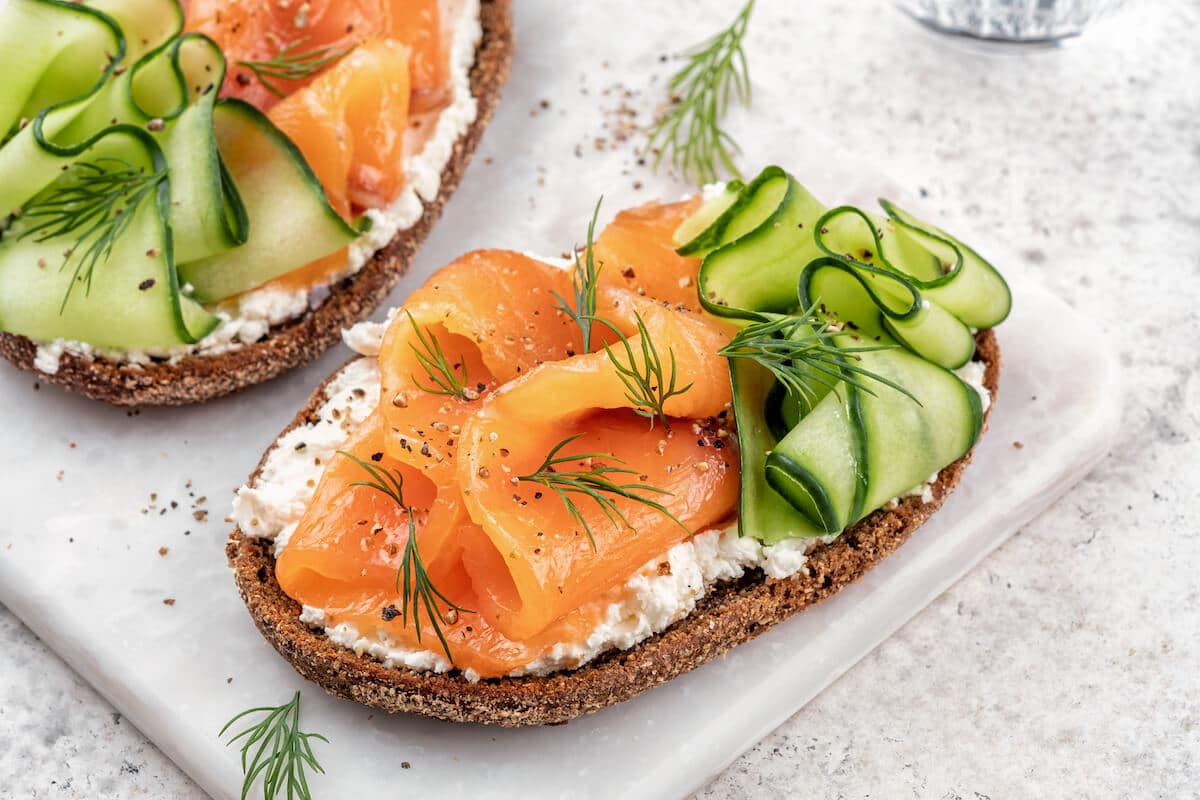
Now that you have a better idea of what to eat for your pre-workout meals, and when to have them, let’s look at some easy combo ideas to get you started.
These are listed from slow-digesting to fast-digesting options. Remember that the slower-digesting proteins like beef and chicken should be consumed two to three hours pre-workout. If not, have those heavier meals post-workout.
- Chicken or lean beef with sweet potato and broccoli
- Chicken or fish with brown rice and roasted veggies
- Lean protein like turkey or chicken on whole-grain bread, with salad on top or on the side
- Oats with banana or blueberries, plus yogurt or nut milk
- Granola with yogurt (again, watch out for the sugar content)
- An omelette and whole-grain toast with smashed avocado
- Boiled eggs on toast with some blueberries on the side
- Whole-grain crackers with cottage cheese or hummus
- Protein bar or trail mix
- Piece of fruit — like an apple or banana — with peanut or other nut butter (on a sandwich if you like)
- Greek yogurt topped with fruit
- Fruit smoothie with yogurt or nut milk and fruit of your choice, plus added protein powder
Note: If you have a health condition of any kind, consult a dietitian or another healthcare practitioner to make sure what you’re eating is suitable for you.
What to Eat Post-Workout
Post-workout meals help to replace the energy you’ve used up and give your body the amino acids it needs to repair any muscle damage. You’ll need some carbs but protein is important after a workout, especially if you’re doing strength training.
You can eat the same foods as for the pre-workout meals, but boost up the protein content. You can also include some of the slower-digesting proteins in your post-workout meals.
What Not to Eat
It goes without saying that eating a pre-workout meal — or a post-workout one — that’s loaded with added sugar or trans fats isn’t going to help your health. Avoid fried foods, pizza, burgers, chips, doughnuts, and sugary drinks. As a general rule, keep your food as close to natural as possible.
It’s also a good idea to pass on spicy foods, beans, and cruciferous vegetables like broccoli, cauliflower, or Brussels sprouts just before you hit the gym. These are notoriously hard to digest and dealing with gas while you’re working out can be very uncomfortable.
Make Healthy Pre-Workout Meals Part of Your Training Routine
When you’re training intensely, it’s crucial to give your body what it needs to meet your health goals. That means all the macronutrients — protein, carbs, and healthy fat — plus fresh fruit and veggies.
Pre-workout meals that include all of these will give you energy to power through your workout, help repair any damage, and build strength and muscle mass. Consider adding a protein powder supplement from Ingredient Optimized to support your muscle-building efforts even further.
Although the precise timing of your meals might not be as important as once thought, you do need to consider your comfort while training and give your food enough time to digest. That way, your body will be fueled and ready to take you through your best workout yet.


